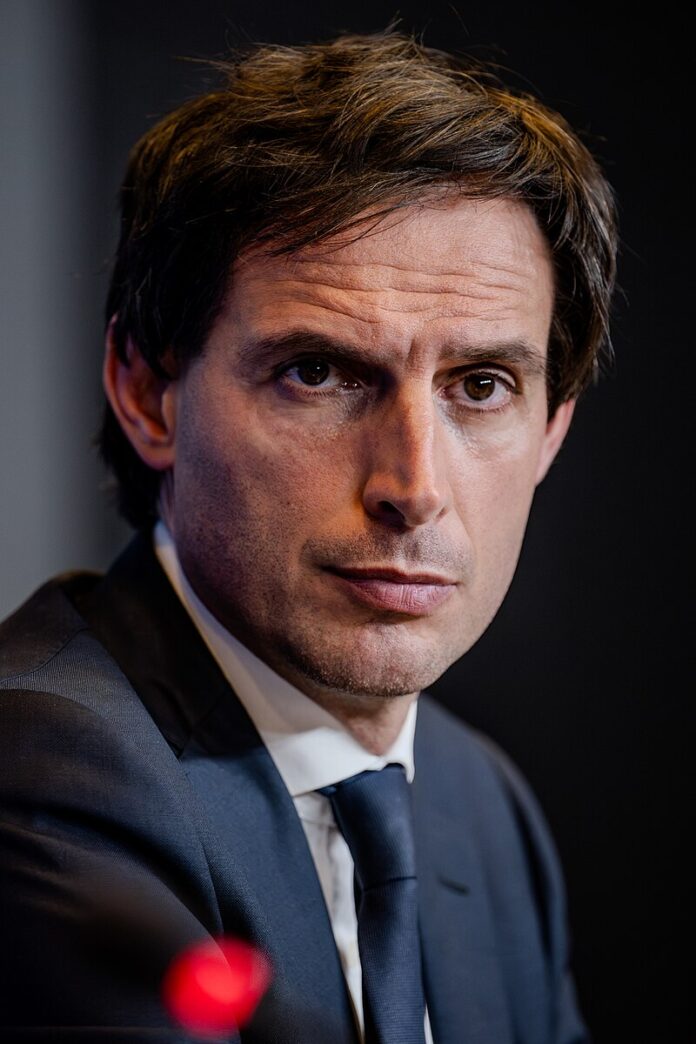
Despite the hammering for green parties in the 2024 European Parliament election, the European Commission simply wants to remain on the same, expensive path when it comes to climate policy. The EU’s Climate Commissioner, Dutchman Wopke Hoekstra (picture), is reportedly keen to stick to plans to propose a 90 percent emissions cut compared to 1990 for the EU’s 2040 climate target. This is one of the many targets in the context of the EU’s climate policy, which increasingly resembles central planning.
Thankfully, a number of EU member states are listening to the signals coming out of European society, which increasingly opposes these kinds of policies. Due to their resistance, Hoekstra is now looking to provide more flexibility in how to implement these grand goals through their “National Energy and Climate Plans (NECPs)”.
Hoekstra is a member of the Dutch Christian Democrats and used to work at McKinsey & Company as a business consultant. One would therefore assume he is more sensitive to economic reality than some of his colleagues, as for example the die-hard socialist EU Commissioner from Spain, Teresa Ribera, who has been fiercely resisting any watering down of climate plans. For now, however, it looks like Hoekstra will largely go along with her. He has openly stressed that it is important to stay the course on climate policy, stating: “A resilient, secure and sustainable Europe depends on ambitious climate policies. That means both cutting emissions and adapting to our already changing climate.”
This is despite the deep troubles of Europe’s chemical industry, which serves as the bedrock for all other industries. It is facing divestment, largely due to structurally elevated European energy prices, which are kept at a high level due to EU climate policies. The US natural gas price alone, for example, is lower than the total cost of the EU’s Emission Trading Scheme (ETS), an effective climate tax.
Will @vonderleyen open up to scrapping the EU's ETS climate tax? In itself this is higher than the total US gas price, outpricing EU industry https://t.co/bC6UJ211fo pic.twitter.com/zmtqfphUUs
— Pieter Cleppe (@pietercleppe) February 11, 2025
Higher taxes
Also in other policy areas, Hoekstra seems to have completely abandoned economic reason. According to German newspaper Bild, the European Commission is considering to push for higher taxes that would make cigarettes 30 percent higher already from 2026 on.
Hoekstra is responsible for this, as he is competent for the revision of the Tobacco Excise Tax Directive (TED), as EU Commissioner for Climate, Net Zero and Clean Growth, which somehow also includes taxation. Reportedly, he not only wants to slap more taxes on cigarettes, but also on other, alternative nicotine products, such as e-cigarettes, heated tobacco, and nicotine pouches.
Also here, several Member States have already signaled opposition, with Romania, Italy, and Greece among the most vocal opponents. As a result, the issue was left out of the Commission’s 2025 work programme. Concerns are that even higher taxes would disproportionately impact less wealthy member states as well as consumers through inflation. Even Commission President Von der Leyen herself is reportedly skeptical about it, as she fears an increase in inflation is not a good idea in the context of the current economic difficulties.
Not only the fear for higher prices seems to be the concern of the opponents among EU member states. Italy’s Deputy Prime Minister Antonio Tajani sent a letter to Hoekstra, arguing that when it comes to tax, alternative tobacco products should not be treated the same way as traditional cigarettes.
There is a lot to be said about that. Looking at Sweden, it is hard to deny that the one EU member state that has not been legally forced by the EU to outlaw an alternative to cigarettes, snus, not only has among the lowest smoking rates in Europe, but it also has a much lower incidence of smoking-related diseases. In the 1960s, almost half of Swedish men smoked. Today, only around 5% of Swedish adults smoke, while the European average is 24%. Compared to other EU countries, Sweden has 44% fewer tobacco related deaths, 41% lower lung cancer rates and 38% fewer cancer deaths.
Although Sweden has the lower smoking prevalence in the EU, policymakers rarely cite it as an example 🇪🇺
This is despite the fact compared to other EU countries, it has
👉44% fewer tobacco related deaths
👉41% lower lung cancer rates
👉38% fewer cancer deaths pic.twitter.com/8R0lpGlpbI— Smoke Free Sweden (@SmokeFreeSweden) August 22, 2024
Notably, Sweden also imposes lower taxes on alternatives to cigarettes. As always with this, correlation and causation are not as simple, but anyone genuinely caring about reducing European cancer rates should warmly embrace any healthier or non-damaging alternative to cigarettes, instead of giving it a punitive treatment.
Copying the Dutch policy failure
One diplomat that represents a Southern member state has pointed out to Euractiv that high tobacco taxation in France and The Netherlands resulted in black markets and increased cross-border shopping. The diplomat thereby accused Paris and The Hague of now pushing others to “repeat the same mistake”.
Punitive taxes were not enough for the Dutch government to which Hoekstra belonged as deputy Prime Minister, between 2022 and 2023. This government also banned all nicotine pouches, even when these did not contain any tobacco at all, a prohibition that followed years of excise tax increases on traditional cigarettes.
Such policy choices completely ignore all scientific evidence about the harm of nicotine, the addictive element in cigarettes and its alternatives, versus the harm of the tobacco burning process. According to the UK government’s health department, “best estimates show e-cigarettes are 95% less harmful to your health than normal cigarettes.” At a European Parliament hearing on 6 February, Hoekstra however declared outright that “smoking kills, vaping kills”. Somehow, few people blink an eye when a European Commissioner makes blunt unscientific statements.
Unintended consequences
The Dutch regulate-to-death approach, championed by the likes of Hoekstra, aimed at forcing the country’s wider nicotine consumer base into submission, simply did not work. It only encouraged Dutch consumers to buy cheap, unregulated alternatives, creating a booming marketplace for illicit trade profiteers. Between 2020 and 2024, the consumption of untaxed cigarettes in the Netherlands increased from 15% to 25%, straining law enforcement efforts to combat criminal networks and exposing consumers to a variety of harmful chemicals and additives typically found in illicit nicotine products.
What’s more, the same criminals profiting from Dutch nicotine users have gotten rich off peddling other illicit goods. A new OECD study shows that between 2020 and 2021, the Netherlands was the EU’s largest destination for counterfeit goods ranging from watches and handbags to pharmaceuticals.
With such disastrous results, one would think the Netherland’s move to go after nicotine instead of following the more thoughtful Swedish approach would serve as a cautionary tale to the European Commission and other Member States. To some, it has. To others such as France, it has not, creating serious security and economic concerns that are rippling well beyond domestic borders.
Hoekstra’s move is furthermore at odds with the many calls among European policy makers, businesses and civil society, to reduce the EU’s administrative burden. The EU Commission has presented some laudable initiatives in this regard, but continues to come forward with all kinds of new restrictive policies, regulations, and yes, tax increases. Despite his background in business, Hoekstra goes along with the “business as usual” brigade that pushes for ever more EU regulation, restrictions and taxation. With friends like these, anyone supporting entrepreneurship and often life-saving innovation needs no enemies.
“From CSRD to GDPR, the EU’s alphabet soup is still causing despair”. https://t.co/s7fzRBehrK
— Michael Jackson (@WorkMJ) June 3, 2025












